|
|
|
Sort Order |
|
|
|
Items / Page
|
|
|
|
|
|
|
| Srl | Item |
| 1 |
ID:
081500
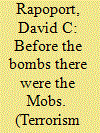

|
|
|
|
|
| Publication |
2008.
|
| Summary/Abstract |
Terrorist studies rarely discuss activities before the invention of dynamite, which made modern terror possible. One important, interesting, and forgotten form is the mob terror campaign. Two significant successful American examples are examined and compared, "The Sons of Liberty" which ignited the American Revolution, and the Ku Klux Klan, which "won the peace" the South wanted after it lost the Civil War. The study concludes by briefly comparing modern with mob terror
|
|
|
|
|
|
|
|
|
|
|
|
|
|
|
|
| 2 |
ID:
081504
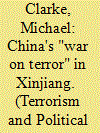

|
|
|
|
|
| Publication |
2008.
|
| Summary/Abstract |
The paper argues that violent Uighur separatism and terrorism conforms in a number of important respects to the human security theory of terrorism, particularly in the realm of political and civil rights. However, it argues that impetus has been given to the various separatist organisations in the region by the development of interconnections between the largely internal aspects of China's policy of integration in the region and the wider Central and South Asian dynamic of Islamic radicalism since 1990
|
|
|
|
|
|
|
|
|
|
|
|
|
|
|
|
| 3 |
ID:
081507


|
|
|
|
|
| Publication |
2008.
|
| Summary/Abstract |
Kurzman (2004) argued that social movements research and Islamic studies "followed parallel trajectories, with few glances across the chasm that have separated them." This article will illuminate one influential process that has relevance to both these areas, the use of small groups for the purpose or radical mobilization. Specifically, it examines the impact of the use of small Islamic study groups (usroh and halaqa) for fundamental and radical Islamic movements. Although small-group mobilization is not unique to Islam, the strategic use of these study groups empowered by the Islamic belief system has yielded significant returns in capacity building for high-risk activism.
|
|
|
|
|
|
|
|
|
|
|
|
|
|
|
|
| 4 |
ID:
081503


|
|
|
|
|
| Publication |
2008.
|
| Summary/Abstract |
After Al Qaeda's destruction of the World Trade Center on 11 September 2001, many democracies reacted to the event, and to international terrorism in general, by passing laws restricting civil liberties and political rights, raising questions about the balance between security and liberty. Such laws have produced alarms among civil libertarians, worldwide. Are the alarms justified? In this article we analyze the relationship between the yearly number of international terrorist attacks in 24 countries from 1968-2003 and (a) measures of civil liberties and political rights as provided by Freedom House, and (b) levels of democracy as measured in the Polity IV scales. We take the number of international terrorist events, by country, from data provided by the Memorial Institute of the Prevention of Terrorism (MIPT) http://www.tkb.org/Home.jsp. Our analysis indicates that there is, generally, no relationship between the number of international terrorist events and the levels of civil rights, political rights, or democracy as measured by the Freedom House and Polity IV indicators. When there is a statistically significant relationship, it is negative, opposite to what is predicted by the tradeoff hypothesis
|
|
|
|
|
|
|
|
|
|
|
|
|
|
|
|
| 5 |
ID:
081508
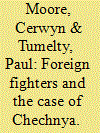

|
|
|
|
|
| Publication |
2008.
|
| Summary/Abstract |
The aim of this article is to explore and analyze the role of foreign fighters in the recent episodes of Russo-Chechen violence in the North Caucasus. The article begins by offering a preliminary theoretical consideration of foreign fighters, indicating how the events in Afghanistan combined with the development of a Salafi-Jihadist movement that would shape subsequent conflicts in the North Caucasus throughout the 1990s. The article will then move on to identify the role of Arab foreign fighters in Chechnya, demonstrating how a complex local and global social networks enable and motivate volunteers
|
|
|
|
|
|
|
|
|
|
|
|
|
|
|
|
| 6 |
ID:
081505
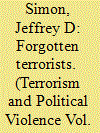

|
|
|
|
|
| Publication |
2008.
|
| Summary/Abstract |
One of the most intriguing, yet forgotten, terrorist groups in history is the Galleanists, an innovative group of militant Italian anarchists active in the United States during the early part of the twentieth century. They introduced tactics and strategies that are widely used today in the world of terrorism. This article examines the rise and fall of the group, and discusses how America's experience with it holds many lessons for understanding today's global terrorist threat
|
|
|
|
|
|
|
|
|
|
|
|
|
|
|
|
| 7 |
ID:
081510
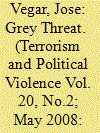

|
|
|
|
|
| Publication |
2008.
|
| Summary/Abstract |
This article starts by establishing a link between the nature of the threats created by jihadist terrorism and global organized crime and the investigation model used by Portuguese intelligence and police entities to detect and eliminate them. The visible manifestations of jihad terrorism and related organized crime recorded in Portugal since 2001 are also documented. The article goes on to analyze most recent theories produced on the importance of intelligence work and criminal investigation in combating these threats. On this basis, the article raises the hypothesis that Portugal's capacity to confront these threats has been dangerously weakened by the investigation powers constraints and conflicts of jurisdiction in the national security system, the lack of effective coordination in the whole system, and delays in the necessary reforms for over a decade
|
|
|
|
|
|
|
|
|
|
|
|
|
|
|
|
| 8 |
ID:
081502
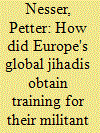

|
|
|
|
|
| Publication |
2008.
|
| Summary/Abstract |
This article examines, compares, and contrasts the ways in which "global jihadis" have trained for terrorism in Western Europe. Before the invasion of Afghanistan, the terrorists received training in Al Qaeda paramilitary camps. After invasion, they had to find alternative training methods and arenas. It is widely assumed that the Internet has taken over the role of the Afghan camps. The current survey suggests that the Internet's role as a "virtual training camp" might be overstated. Although the Net has become an important tool for terrorists on many levels, they maintain an urge to obtain real-life, military-style training in jihadi combat zones. Despite difficulties and risks, many of today's terrorists attend terrorist training facilities in Pakistan or other places. The main characteristic of training practices after the invasion of Afghanistan seems to be that, from an organizational perspective, the push for training and preparation comes from "below" rather than from "above
|
|
|
|
|
|
|
|
|
|
|
|
|
|
|
|
| 9 |
ID:
081501
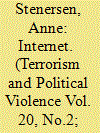

|
|
|
|
|
| Publication |
2008.
|
| Summary/Abstract |
This study aims to investigate how Al Qaeda uses the Internet for military training and preparation. What kind of training material is available on jihadi webpages, who produces it, and for what purpose? The article argues that in spite of a vast amount of training-related literature online, there have been few organized efforts by Al Qaeda to train their followers by way of the Internet. The Internet is per today not a "virtual training camp" organized from above, but rather a resource bank maintained and accessed largely by self-radicalized sympathizers
|
|
|
|
|
|
|
|
|
|
|
|
|
|
|
|
| 10 |
ID:
081509


|
|
|
|
|
| Publication |
2008.
|
| Summary/Abstract |
The trends leading to the emergent threat of terrorist laser weapons use are that a military weaponry transition from conventional to Directed Energy Weapons is taking place; that laser weapons offer clear tactical and operational advantages over conventional weapons; that laser prices are dropping while laser performance is increasing; that criminals, criminal-soldiers, and foreign militaries have all utilized laser devices and weapons for counteroptical purposes; and that criminal-soldiers are evolving and getting more sophisticated from both an organizational and weaponry use perspective. This article will look at the aforementioned trends, analyze them, and then offer some concluding thoughts concerning terrorist laser weapons use futures
|
|
|
|
|
|
|
|
|
|
|
|
|
|
|
|
| 11 |
ID:
081506


|
|
|
|
|
| Publication |
2008.
|
| Summary/Abstract |
This study explores the meaning of "dirty war;" a term that has been in increasing usage in popular and academic discussion. It endeavors to detach the phrase from its normative connotations, and using a strategic methodology along with supporting case studies, seeks to arrive at a theoretical exposition of the dirty war concept. The investigation attempts to provide a working definition that helps make sense of the term, and develops some notions of what dirty war might constitute in contradistinction to its antonym, clean war. It is argued that dirty war represents a form of strategic practice occurring in the gray area between the criminal justice and war models of counterinsurgency, and possesses its own distinctive escalatory path. Finally, the analysis returns to the ethical and normative features implicit in the term, pointing to the outstanding dilemmas that continue to permeate the study of war
|
|
|
|
|
|
|
|
|
|
|
|
|
|
|
|
|
|
|
|
|